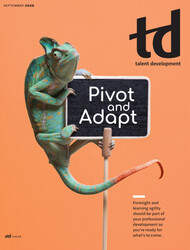TD Magazine Article
Foster a Psychologically Safe Virtual Workplace
Managers play a critical role in enabling employees to thrive while they work remotely.
Tue Sep 01 2020

Earlier this year, many workforces transitioned to a new work-from-home model to help combat the spread of COVID-19. In many cases, that transition took place essentially overnight, with organizations that had never previously supported virtual work adapting on the fly. As managers now take a step back to evaluate best practices in virtual work, they can use Advanced Workplace Institute's new research as a guide.
In 2014, AWI partnered with the Centre for Evidence Based Management to conduct research on the factors that influence productivity among knowledge workers, particularly in contexts where employees were not physically together. In 2020, the two organizations updated that research in response to the increased prevalence of virtual work during the pandemic. The research found that knowledge workers require the same factors to be productive regardless of whether they are working in an office or remotely. However, when teams are not interacting face to face, those factors are harder to maintain and require a more conscious focus.
The factors that influence knowledge workers' productivity and performance are social cohesion, trust, perceived supervisory support, information sharing, vision and goal clarity, and external communications. Teams that work apart may communicate less frequently and have fewer social interactions, which can negatively affect any of the success factors, particularly social cohesion, trust, and information sharing. Managers need to deliberately foster those elements rather than letting them develop—or fail to develop—by chance.
The research also uncovered findings that can help virtual teams perform more effectively. One key finding is that virtual workers respond well to transformational management styles in which managers ask for employees' input on decision making and outcomes. Another finding is that trust and communication form the foundation of successful teams and enable other aspects, such as information sharing and goal clarity, to flourish. Managers should focus their attention on those factors to create psychologically safe virtual workplaces where knowledge workers can thrive.

